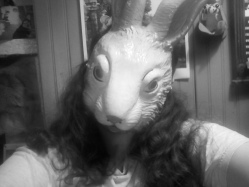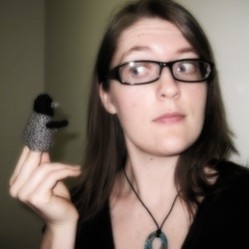He warned his wife the villagers would come. With their pitchforks, their fire. Their hateful ignorance.
“I’m sorry,” he said. “We have to leave. They saw beneath my mask.”
She did not listen. This was their home. Their little cottage by the burbling mountain stream. Their hard-won resting place after years of rootless travel, where they kept their lovingly tended garden with its fragrant roses and flowering vines, where she eschewed her strange abilities and practiced only mortal skill. An ideal place for a family, though they knew they could never have children now.
When he began to protest her lack of urgency she forced him into stillness and silence. She had that power.
“We’ve made friends in town,” she said. “They’ve no reason to harm us.”
Always prepared to believe the best of people. Always willing to give them the benefit of the doubt. That was his wife. Too trusting. Too optimistic. One of the many reasons he loved her.
Struck mute by her spell, he could not share his thoughts. Or warn her of the fear and revulsion he had witnessed on the townsfolk’s faces when his mask slipped and they glimpsed his true nature.
“We mean you no harm,” she cried as the mob at last turned up at their rose-entwined gate. “Can’t you leave us in peace?”
No. They could not. They died even as she tried to spare them.
Banished into the deepest shadows of the house by her unbreakable command, he could only watch as the slaughter unfolded. In the end, the townsfolk’s bloody determination and sheer numbers overpowered her best defenses. Only when she fell and uttered her final spell was he at last free to move, but by then it was too late. Countless bodies littered the garden, their bones dissolved or stretched into gruesome, unsurvivable shapes. Hers lay at the center.
He ran to pick her up. He hugged her close, kissed her cooling skin, rocked her back and forth as if she were a child in need of comfort, as if holding her tight could prevent any further life force from escaping. But it was already gone. No power he possessed could bring it back.
More people from the town approached the house, stragglers to the promise of violence or perhaps those simply curious of the outcome. They darted away again when they saw the scale of the devastation. The true cost of their mindless intolerance. The osteomancer’s husband didn’t look up. He no longer cared if they returned.
On sudden impulse he laid down her body. He tore off his carefully painted mask, his human skin gloves, the cloak and thick clothes that padded and hid his body. He stood and walked to the potting shed — leaning precariously but otherwise undamaged by the violence — and retrieved a rusty but serviceable spade from inside. He stabbed the blade into the trampled lawn and carved out a shallow grave. No longer encumbered by his public disguise it did not take him long to bury his wife, his motions swift and efficient. Afterwards he sat down beside the freshly piled earth. He felt numb and hollow, unable to think of what else he should do.
He expected to die soon. To wind down. His fate was tied to hers, wasn’t that how it worked? Spells faded with their caster. But he had never really known much about her strange magic. He had always been more physical than cerebral, a doer rather than a thinker. Her perfect complement. Of her magic, he knew only that she used it to heal and to help. The children with their broken limbs. The horses and the cattle in the field when they stumbled and shattered their legs. Even the loudmouth drunkards who smashed their skulls fighting each other every payday night.
And he himself. He had felt her power, too, those years ago. Darkness one moment. Then back again, as if the fall had never happened. Except he had felt that terrible crack, that shooting final pain as his neck snapped. His lungs become so heavy he was unable to draw breath. He would never forget that.
After her magic touch he moved and spoke and did so many things as he could before. But her power was only over his bones, not his flesh. It soon began to decay. All the ointments and bindings she so desperately tried to apply could not hide the truth or stop his skin and muscles and sinew from unraveling. All too soon he was nothing but bones. Bones, and an indomitable animating spirit.
For her it was enough. “I see my memory of you,” she said. “Not the reality.” And when he got used to the strange practicalities, it was enough for him too.
The sound of shifting earth disturbed him from his thoughts. At first he feared some scavenger had slunk behind his back to disturb her grave, but when he turned he found no dog or cat or rat foraging in the freshly turned earth. Instead, he saw a creamy white stalk snaking up from the soil.
The growing bloom swayed gently, almost imperceptibly, like some undersea coral agitated by the slow tides and currents of an invisible ocean. It slowly rotated towards him.
He fell to his knees and said, “My dearest, I knew it! Have you returned?”
There was no reply.
As night descended and the townsfolk gathered again with their newly lit torches, he watched the ivory flower grow taller and sturdier and more intricate. It grew despite the sun having escaped the sky–a night bloom. Before long it was twice his height. Roots like femurs twisted through the soil, sprouting into a crescent of pelvic bones, exploding into a bloom of ribs and tibias and a crowning display of skulls and grinning teeth. Despite its grisly nature, he thought it beautiful.
For he saw the memory of her, not the reality.
The night deepened and the bone flower grew more complex, more intricate, sprouting a thousand petals, each like a curled finger bone. And clustered deep within, growing larger every moment, tiny seed-like structures.
A hot wind swirled around the devastated garden. The amassing villagers grew more bold. More belligerent. They jeered and shouted of vengeance and justice and burning out evil. A daring few drew closer, retreating as he made a move, but never quite far back as before. It would not be much longer before they realized he posed no real threat to them. His hands were stiffening, his joints seizing. Every move more difficult than the last. Eventually he knew he would simply tumble apart.
The villagers let out a roar and broke towards the house. He reached up and snapped off a handful of enameled seedlings. Like tiny teeth, tiny skulls, tiny snowflake vertebrae. The rising wind swept them from his cupped fingers, up and out, far and wide. Escaping like willful, eager children. Like dreams and hopes of what could have been.
What strange flowers they might grow.
© 2016 by Henry Szabranski
Author’s Note: The inspiration for this story were a couple of photographs used for a writing group prompt challenge. One image was of flowing water (“…the burbling mountain stream…”), the second was of a hand tossing what looked like tiny bones to the wind (“Like…tiny snowflake vertebrae…”). To me the bones looked like seedlings, so I immediately began to wonder what their origin might be.
 Henry Szabranski was born in Birmingham, UK, and studied Astronomy & Astrophysics at Newcastle upon Tyne University, graduating with a degree in Theoretical Physics. His stories have previously been published in Beneath Ceaseless Skies, Daily Science Fiction, Lakeside Circus, Fantasy Scroll Magazine, Kaleidotrope and in Fantasy For Good: A Charitable Anthology, amongst other places. He lives in Buckinghamshire with his wife and two young sons. Visit his blog at http://www.henryszabranski.com or follow him on Twitter @henryszabranski
Henry Szabranski was born in Birmingham, UK, and studied Astronomy & Astrophysics at Newcastle upon Tyne University, graduating with a degree in Theoretical Physics. His stories have previously been published in Beneath Ceaseless Skies, Daily Science Fiction, Lakeside Circus, Fantasy Scroll Magazine, Kaleidotrope and in Fantasy For Good: A Charitable Anthology, amongst other places. He lives in Buckinghamshire with his wife and two young sons. Visit his blog at http://www.henryszabranski.com or follow him on Twitter @henryszabranski
If you enjoyed the story you might also want to visit our Support Page, or read the other story offerings.






